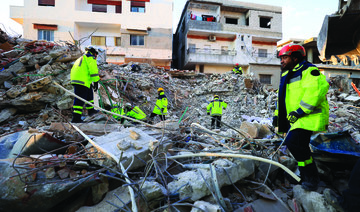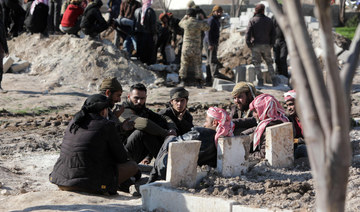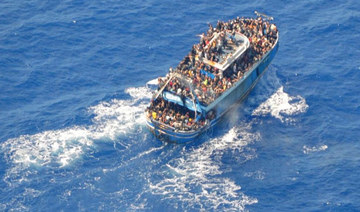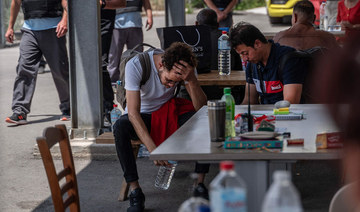NEW YORK CITY: The international community must not abandon the 4 million children in Syria for whom the Feb. 6 earthquakes came as “a trauma on top of trauma,” the UN’s Children’s Fund, UNICEF, has warned.
“It is our duty to make sure that we do not forget them,” said Adele Khodr, the organization’s regional director for the Middle East and North Africa.
“It is our duty, as well, to ensure that this earthquake does not make them even worse than what they are, and we should leave anything that is political aside and focus only on the humanitarian.”
Ten days after a massive earthquake and major aftershocks devastated parts of southern Turkiye and northwestern Syria, the confirmed death toll exceeds 41,000, and continues to rise. UNICEF fears thousands of children are among the dead, while millions of young people who survived are in dire need of humanitarian assistance.
An estimated 7 million children were directly affected by the earthquake in the two countries, including 2.5 million in Syria. Khodr told Arab News that what worries her most is the unknown number of young people in remote villages that have not been reached by international aid organizations and so have yet to receive any humanitarian assistance.
“What we know about, we can address,” she said. “But what really is worrying for us is what we don’t know about.”
As hopes of finding survivors in the rubble of collapsed buildings fades, search and rescue operations are winding down and so the aid effort will increasingly turn toward helping people in areas that have not been reached so far, she added.
Many children and their families are in desperate need of additional support, Khodr said. In addition, many first responders and employees of the local partner organizations with which UNICEF works were killed, injured or displaced, while their offices and equipment were damaged or destroyed.
The existing situation in the country before the disaster struck was not “a normal background,” Khodr said. The earthquake is an “emergency on top of an emergency,” after 12 years of civil war that have drained Syria of resources and destroyed much of its infrastructure.
She said the natural calamity has compounded “a very serious economic crisis” that was already unfolding, including a decline in the value of the Syrian pound, the effects of which included the deterioration of basic health services for children and the education system.
In addition, the country has been dealing with a cholera epidemic since September, exacerbated by damage to water infrastructure caused by the war and now made even worse by this month’s disaster.
“The earthquake has damaged water tanks, especially elevated ones,” said Khodr. “Some water pipes have also been dislocated, which means the availability of water is going to be a very big issue.
“And the fact, also, is that people now might be staying inside big centers, like schools or other public buildings: How do you get rid of the wastewater and the solid waste? All these things around water sanitation and hygiene are worrying in areas that were already subject to a cholera epidemic.
“We are very worried that should spring come and should the damaged water and sanitation infrastructure not be repaired, we would be heading into a serious health (crisis) with waterborne diseases (spreading) among the children.”
The earthquake damaged or destroyed many buildings, so millions of children and their families are now sleeping outside, on the sides of roads or under bridges, or in public buildings that remain intact, such as schools and bus stations.
Even those whose homes are still standing are afraid to return home to buildings that might be structurally unsound and vulnerable to aftershocks, or might collapse as a result of heavy rain or other severe weather events.
Sleeping outside, exposed to harsh winter conditions in which freezing rain and snow are not uncommon, is already leading to growing numbers of children suffering from hypothermia or acute respiratory infections, said Khodr.
UNICEF is also worried about the mental health of children driven from their homes, she said, especially in the rebel-held northwest of the country where families had already been displaced at least once — and some more than three times — before the earthquake.
“Many children said that they felt that the whole world was spinning around them,” Khodr said. “This psychosocial impact on children is one of our first worries.”
Further displacement, combined with the dire economic situation, once again raises the specter of growing food insecurity, she added, and the “already higher level of poverty in some pockets in those areas could lead to more cases of malnutrition among children.”
Meanwhile, many people who have lost their homes are seeking refuge inside schools, which means classes will not immediately resume and children’s education will suffer as a result, said Khodr.
The immediate efforts by UNICEF to save lives in Syria in the aftermath of the earthquake includes shipments of hygiene kits, food, drinking water, warm winter clothes and tents, along with the provision of medical aid.
The organization is also working with local partners to provide children with psychosocial and mental health support. It is distributing recreational kits “for the children to keep them busy and to try to establish a sense of normalcy in their lives and allow them to deal with the trauma that they have been through,” Khodr said.
For a week after the earthquake, the Syrian regime refused to allow any deliveries of aid to rebel-held areas in the northwest of the country and insisted that all humanitarian assistance should go through the capital, Damascus.
But following intensive international pressure to open more crossings along Syria’s border with Turkiye to allow the delivery of aid, President Bashar Assad on Monday approved the reopening of two additional crossing points, Bal Al-Hawa and Al-Raee, for an initial period of three months, the UN said.
Despite the continuing politicization of aid mechanisms in Syria, Khodr said that “we are a child rights-based agency and (our) mandate remains a purely humanitarian one. Our position is that we have to continuously try to reach all the children wherever they are, through whatever means.
“We cannot select to use X or Y, we have to select and use whatever is available for us and we will continuously push for access using all these means.
“The essential thing is to be able to reach every child. And it doesn’t matter how.”
Syrian kids feel the whole world is ‘spinning around them,’ UNICEF official says
https://arab.news/z8rsc
Syrian kids feel the whole world is ‘spinning around them,’ UNICEF official says
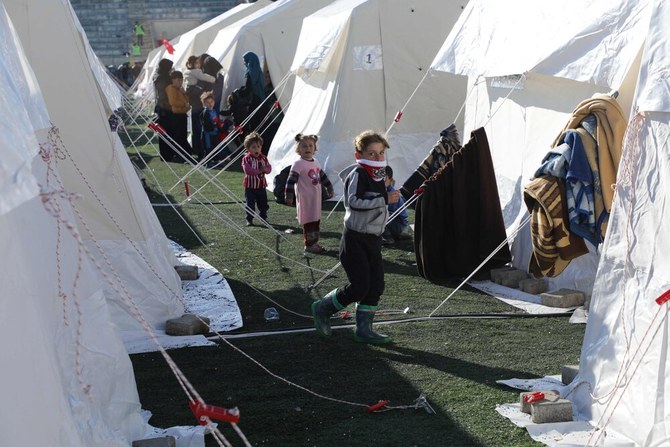
- Regional director Adele Khodr told Arab News the priority now is to help earthquake victims in places not yet reached by aid organizations
- The disaster left millions of Syrian children sleeping outside in harsh winter conditions, amid concerns about their mental health and the risk of disease
A Palestinian converted to Judaism, killed by an Israeli soldier who saw him as a threat

In his final moments, he was once again viewed as a Palestinian who was in the wrong place, at a time of widespread anger and suspicion
JERUSALEM: At first, it seemed like the kind of shooting that has become all too common in the Israeli-occupied West Bank. A Palestinian aroused suspicions and an Israeli soldier killed him.
But then the deceased was identified as David Ben-Avraham, a Palestinian who had made the almost unheard-of decision to convert from Islam to Judaism years earlier.
His unusual journey had taken him across some of the deepest fault lines in the Middle East and led to some unlikely friendships. Most Palestinians saw him as an eccentric outcast, while many Israelis treated him as an unwelcome convert to a religion that doesn’t proselytize.
But in his final moments, he was once again viewed as a Palestinian who was in the wrong place, at a time of widespread anger and suspicion.
A DIVIDED CITY
He was born Sameh Zeitoun in Hebron, home to some 200,000 Palestinians as well as hundreds of Jewish settlers who live in enclaves guarded by Israeli troops. Tensions have run high for decades, often spilling over into violence.
Rights groups have long accused Hebron’s settlers of harassing Palestinian residents, and Palestinians have committed a number of stabbing and shooting attacks against Israelis over the years.
At its most extreme, the bitter neighbors live just a few meters apart. In some narrow alleys of Hebron’s Old City, metal netting protects Palestinian shoppers from objects thrown by settlers living on the upper floors.
Zeitoun first made contact with Jewish settlers over a decade ago, asking for help converting to Judaism, according to Noam Arnon, a Jewish settler in Hebron who went on to befriend him.
He said Zeitoun was inspired by family stories about his grandfather protecting Jews when riots erupted in 1929, when the Holy Land was under British colonial rule. Palestinians killed dozens of Jewish residents in the city.
“He went further, not only to live as a good neighbor but to join the Jewish community,” Arnon recounted.
A RARE CONVERSION
Conversion to other faiths is deeply frowned upon in Islam. In much of the Muslim world, those who do so are cast out of their communities, sometimes violently. Judaism, unlike Islam and Christianity, has no tradition of proselytization.
Such a conversion is even more fraught in Israel and the Palestinian territories, where religion and nationality usually overlap in a decades-old conflict. Judaism is the faith of most of the soldiers who patrol the territory and the settlers whom Palestinians see as hostile colonizers.
Arnon said most of the settlers from Hebron’s tight-knit community refused to accept Ben-Avraham. Only Arnon and a few others interacted with him, helping with his conversion application papers.
Religious conversions are rare but legal in areas administered by the semi-autonomous Palestinian Authority. Most are undertaken by Palestinian Christians converting to Islam for marriage.
In Israel, converting to Judaism requires an application to the government-run Conversion Authority. Ben-Avraham submitted two requests in 2018 but did not meet the requirements, according to a government official who was not authorized to speak with media and spoke on condition of anonymity.
With that pathway closed, Ben Avraham turned to Israel’s insular ultra-Orthodox community and eventually made his conversion official in 2020, according to documents published online.
AN ARREST
In the year before his conversion, Ben-Avraham was detained by the Palestinian Authority’s intelligence unit in Hebron, according to Arnon and a local Palestinian activist, Issa Amro.
The reason for his arrest was never publicly disclosed, but they believe his conversion and open connections with Israelis attracted unwanted attention.
Palestinians can face arrest or even death if they’re seen as collaborating with Israeli authorities. But few would have suspected Ben-Avraham of being an informant because his story was widely known.
Ben-Avraham told the Israeli news site Times of Israel that he was held for two months in solitary confinement and beaten before being released. Around that time, a video emerged showing him holding what appears to be a Qur’an and pledging his Muslim faith.
Arnon and Amro said his statement was likely made under duress during detention. The PA’s prosecution office said it had no information about his case.
After his release, Ben-Avraham moved in with Haim Parag, a Jewish friend who lived in Jerusalem. He returned to Hebron infrequently because of safety concerns and continued his Jewish studies. Parag said the pair regularly prayed together at a nearby synagogue.
“He was like a son to me,” he said.
Parag also said he met Ben-Avraham’s wife and some of his children, and that several close family members maintained a relationship with him even after his conversion.
The Zeitoun family declined to speak with The Associated Press, fearing reprisal. In the end, Ben-Avraham left little public record of what drove his personal convictions.
A DEADLY SHOOTING
Ben-Avraham was waiting outside a West Bank settlement for an Israeli bus to take him to Parag’s apartment March 19 when he got into an argument in Hebrew with an Israeli soldier.
Across the West Bank, Jewish settlers live apart from Palestinians in guarded settlements where they’re subject to different laws. Palestinians are generally barred from entering settlements unless they have work permits.
“Are you Jewish?” the soldier shouts in a video that circulated online and appears to have been shot by his body camera.
“Of course,” Ben Avraham answers.
“What’s your name?” the soldier says.
“David.” he replies.
“David?” the soldier says.
“Ben-Avraham, stupid.”
The soldier then orders Ben-Avraham to step away from his bag on the ground and raise his hands in the air, before saying sarcastically, “Jewish.”
A second video, apparently taken from a nearby security camera, appears to show two soldiers shooting Ben-Avraham from a close distance as he keels over backward onto the sidewalk.
The army said a small knife was found in Ben Avraham’s bag after the shooting. Parag said he gave him the knife for self-defense.
The Israeli army said it’s investigating the shooting, but rights groups say soldiers are rarely held accountable in such situations.
Israeli forces have been on high alert as the West Bank has seen a surge of violence linked to the war in Gaza. Nearly 500 Palestinians have been killed by Israeli fire since the war’s start, according to the Palestinian Health Ministry. Many have been shot dead in armed clashes during military raids, others for throwing stones at troops, and some who were posing no apparent threat.
Palestinians have also carried out several stabbing and other attacks against Israelis.
Arnon said the shooting was a tragic misunderstanding. Parag, Ben-Avraham’s friend in Jerusalem, accused the soldiers of racial profiling, saying they saw Ben-Avraham for his background and not his unexpected beliefs.
A FUNERAL
Even in death, Ben-Avraham’s identity was contested.
Parag and another Israeli friend asked an Israeli court for the body to buried him at a Jewish cemetery, filing a petition against members of the Zeitoun family who wanted a Muslim funeral. Bezalel Hochman, a lawyer representing the two Israelis, said the Tel Aviv family court ruled in their favor.
After his death caused a public outcry, the Interior Ministry granted him Israeli residency, saying it wanted “to fulfill the will and desire of the deceased to be part of the nation of Israel.”
Ben Avraham was buried in April in a Jewish cemetery on the foothills of Mount Gerizim, near the Palestinian city of Nablus, Parag said. The hilltop is sacred for Samaritans — a small, ancient religious minority that straddles the Palestinian-Israeli divide, just like Ben-Avraham.
No one from the Zeitoun family attended the funeral, said Parag, who’s designing his friend’s gravestone.
He said it will read: “David Ben-Avraham Zeitoun Parag. The Holy Jew.”
Hamas authorities say over 100 academics killed in Gaza war

- Among those on the list of 104 names is Sufyan Tayeh, who was the president of the Islamic University and a leading researcher in physics and applied mathematics
- Top surgeon and professor of medicine Adnan Al-Barsh was also listed
GAZA STRIP, Palestinian Territories: Gaza authorities released a list on Thursday of more than 100 academics and researchers they say have been killed by Israeli forces since war broke out over seven months ago.
“We strongly condemn the occupation’s assassination of scientists, academics, university professors and researchers, who are a distinguished group in the Palestinian society in the Gaza Strip,” the Hamas government’s media office said in a statement.
“This sends a clear message that they aim to completely eliminate scientists and researchers in the educational sector,” it added.
Among those on the list of 104 names is Sufyan Tayeh, who was the president of the Islamic University and a leading researcher in physics and applied mathematics.
Top surgeon and professor of medicine Adnan Al-Barsh was also listed.
According to the Palestinian Prisoners Club, Barsh, 50, died in Israeli custody on April 19 after being detained with other doctors at Al-Awda Hospital in northern Gaza last December.
Asked at the time about his reported death in custody, the Israeli army said it was “currently not aware of such (an) incident.”
The Hamas government called on the “free countries of the world and all organizations related to education and higher education worldwide to condemn this historical crime and to pressure the occupation to stop the genocidal war.”
Its statement came against the backdrop of student protests against Israel’s conduct of the war on campuses across the United States and beyond.
Many of the demonstrators have called on their universities to divest from companies that allegedly contribute to human rights violations in the occupied Palestinian territories.
The bloodiest ever war in Gaza broke out when Hamas launched a surprise attack on Israel on October 7 that resulted in the deaths of more than 1,170 people, mostly civilians, according to an AFP tally of Israeli official figures.
Israel’s retaliatory war against Hamas has killed at least 35,272 people in Gaza, mostly women and children, according to the Hamas-ruled territory’s health ministry.
Greek defense team says 9 Egyptians accused of causing deadly shipwreck were misidentified as crew

- The nine are due to go on trial in Kalamata on May 21 on a series of charges, including migrant smuggling, participation in a criminal organization and causing a deadly shipwreck
- They face multiple life sentences if convicted
ATHENS: The legal defense team for nine Egyptian men due to go on trial in southern Greece next week accused of causing one of the Mediterranean’s deadliest shipwrecks said Thursday they will argue that Greece has no jurisdiction in the case, and insisted their clients were innocent survivors who have been unjustly prosecuted.
The nine, whose ages range from early 20s to early 40s, are due to go on trial in the southern city of Kalamata on May 21 on a series of charges, including migrant smuggling, participation in a criminal organization and causing a deadly shipwreck. They face multiple life sentences if convicted.
The Adriana, an overcrowded fishing trawler, had been sailing from Libya to Italy with hundreds of asylum-seekers on board when it sank on June 14 in international waters off the southwestern coast of Greece.
The exact number of people on board has never been established, but estimates range from around 500 to more than 700. Only 104 people survived — all men and boys from Syria, Egypt, Pakistan and two Palestinians — and about 80 bodies were recovered. The vessel sank in one of the Mediterranean’s deepest areas, making recovery efforts all but impossible.
The Greek lawyers who make up the defense team spoke during a news conference in Athens on Thursday. They maintained their clients’ innocence, saying all nine defendants had been paying passengers who had been misidentified as crew members by other survivors who gave testimonies under duress just hours after having been rescued.
The nine “are random people, smuggled people who paid the same amounts as all the others to take this trip to Italy aiming for a better life, and they are accused of being part of the smuggling team,” lawyer and defense team member Vicky Aggelidou said.
Dimitris Choulis, another lawyer and member of the legal team, said that Greek authorities named the defendants as crew members following testimonies by nine other survivors who identified them for having done things as simple as handing bottles of water or pieces of fruit to other passengers.
“For nearly a year now, nine people have been in prison without knowing what they are in prison for,” Choulis said.
“For me, it is very sad to visit and see people in prison who do not understand why they are there,” he added.
While the Adriana was sailing in international waters, the area was within Greece’s search and rescue zone of responsibility. Greece’s coast guard had been shadowing the vessel for a full day without attempting a rescue of those on board. A patrol boat and at least two merchant ships were in the vicinity when the trawler capsized and sank.
In the aftermath of the sinking, some survivors said the coast guard had been attempting to tow the boat when it sank, and rights activists have accused Greek authorities of triggering the shipwreck while attempting to tow the boat out of Greece’s zone of responsibility.
Greek authorities have rejected accusations of triggering the shipwreck and have insisted the trawler’s crew members had refused to accept help from the nearby merchant ships and from the Greek coast guard.
A separate investigation being carried out by Greece’s naval court hasn’t yet reached any conclusion, and the defense team hasn’t been given any access to any part of it.
The Egyptians’ defense team also argues that because the shipwreck occurred in international waters, Greek courts don’t have jurisdiction to try the case, and the defense will move to have the case dismissed on those grounds when the trial opens in Kalamata next week.
Greece lies along one of the most popular routes into the European Union for people fleeing war and poverty in the Middle East, Africa and Asia. While most of those cross into the country’s eastern Aegean Sea islands from the nearby Turkish coast, others try to skirt Greece altogether and head from north Africa to Italy across the longer and more dangerous Mediterranean route.
On Thursday, Greece’s coast guard said that 42 people had been rescued and another three were believed to be missing after a boat carrying migrants sent out a distress call while sailing south of the Greek island of Crete.
Officials said they were alerted by the Italian coast guard overnight about a boat in distress 27 nautical miles (31 miles or 50 kilometers) south of Crete. Greece’s coast guard said that 40 people were rescued by nearby ships, and another two were rescued by a Greek navy helicopter.
A search and rescue operation was underway for three people reported by survivors as still missing. It wasn’t immediately clear what kind of vessel the passengers had been on, or why the boat sent out a distress call.
Turkiye convicts former pro-Kurdish party officials over Kobani protests

- Yuksekdag was sentenced to more than 30 years in prison
- The court has not yet ruled on the HDP co-leader Selahattin Demirtas
ANKARA: A Turkish court convicted former leading officials from the pro-Kurdish HDP party, including co-leader Figen Yuksekdag, on Thursday for instigating 2014 protests triggered by a Daesh attack on the Syrian Kurdish town of Kobani.
The verdict was likely to fuel political tensions in Turkiye around the Peoples’ Democratic Party (HDP), which is facing potential closure in a separate court case and has been succeeded in parliament by another pro-Kurdish party.
In total, Yuksekdag was sentenced to more than 30 years in prison. The court has not yet ruled on the HDP co-leader Selahattin Demirtas.
Thirty-seven people died in the 2014 protests, which were triggered by accusations that Turkiye’s army stood by as the ultra-hard-line Daesh militants besieged Kobani, a Syrian border town in plain view of Turkiye.
Those convicted were among 108 defendants, including senior HDP figures, charged with 29 offenses including homicide and harming the unity of the Turkish state. The HDP denied the charges.
Israel says more troops to ‘enter Rafah’ as operations intensify

- Israeli forces took control earlier in May of the Gaza side of the Rafah crossing with Egypt
- 600,000 people have fled Rafah since military operations intensified: UNRWA
JERUSALEM: Israel’s Defense Minister Yoav Gallant said that more troops would “enter Rafah” as military operations intensify in Gaza’s far-southern city, in remarks issued by his office Thursday.
The operation “will continue as additional forces will enter” the Rafah area, Gallant said, adding that “several tunnels in the area have been destroyed by our troops... this activity will intensify.”
“Hundreds of [terror] targets have already been struck, and our forces are manoeuvring in the area,” he said according to a statement released by his office after he visited Rafah the previous day.
Israeli forces took control earlier in May of the Gaza side of the Rafah crossing with Egypt, in a push launched in defiance of US warnings that around 1.4 million civilians sheltering there could be caught in the crossfire.
The United Nations agency for Palestinian refugees, UNRWA, has said “600,000 people have fled Rafah since military operations intensified” in Rafah.
Israeli Prime Minister Benjamin Netanyahu has vowed to launch a full-scale ground operation in Rafah in a bid to dismantle the remaining battalions of Hamas.
Gallant said that the military’s offensive against Hamas had hit the militant group hard.
“Hamas is not an organization that can reorganize, it does not have reserve troops, it has no supply stocks and no ability to treat the terrorists that we target,” he said.
“The result is that we are wearing Hamas down.”
However, Israel’s top ally the United States has warned that it had not seen any credible Israeli plan to protect civilians in Rafah.
Secretary of State Antony Blinken told NBC on Sunday that “Israel’s on the trajectory, potentially, to inherit an insurgency with many armed Hamas left or, if it leaves, a vacuum filled by chaos, filled by anarchy and probably refilled by Hamas.”
The Gaza war broke out after Hamas’s unprecedented October 7 attack on southern Israel which resulted in the deaths of more than 1,170 people, mostly civilians, according to an AFP tally based on Israeli official figures.
Israel’s military retaliation has killed at least 35,272 people, mostly civilians, according to the health ministry in Hamas-ruled Gaza.



